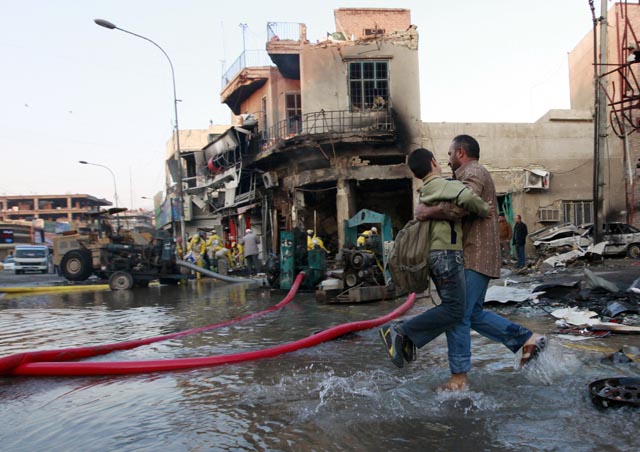BAGHDAD/HILLA — Iraqi Prime Minister Nouri Al Maliki defended his government’s counterterrorism strategy and vowed to defeat Al Qaeda as bombs exploded in Baghdad and another Iraqi city on Tuesday, killing at least 49 people.
Maliki said the battle against militancy in Iraq was part of a larger struggle emanating from the civil war in Syria that poses a threat to the wider Middle East and the entire world, and appealed for international support.
“Iraq has defeated Al Qaeda before, and we have a holistic strategy to defeat Al Qaeda again,” Maliki wrote in an editorial published on Tuesday on the website of US international affairs journal Foreign Policy.
“Because Al Qaeda believes in blowing people up, not in winning people over, it can be beaten, must be beaten, and will be beaten.”
Maliki said Iraq had begun discussions with US officials to resume training for its counterterrorism forces.
Last year was Iraq’s bloodiest since sectarian violence began to abate in 2008. Sunni Islamist insurgents have been regaining ground in the country over the past year and in recent weeks overran several towns.
Critics say Maliki’s own policies are at least partly to blame for reviving an insurgency that climaxed in 2006-07.
Many in Iraq’s once-dominant Sunni minority feel they have been sidelined in the Shiite-led political order that took shape following the US-led invasion in 2003. Some fellow Shiites also accuse Maliki of amassing power and abusing it.
Influential Shiite cleric Moqtada Al Sadr, who announced his withdrawal from politics at the weekend, said Iraq was governed by “wolves thirsty for blood and money”, alluding to Maliki as a “dictator and tyrant”.
Sadr, who led revolts against US forces in Iraq before their pullout and went on to become a major force in the government, said he had decided to retire in order to distance himself from a “failed, corrupt and unjust government”.
“Whenever a Shiite, Sunni or Kurd objects to them, they accuse him of sectarianism or being a terrorist,” he said in his first speech since dissolving his movement on Saturday.
Car bomb explosions
In Tuesday’s attacks, car bombs exploded in predominantly Shiite districts of Baghdad and the southern city of Hilla, police and medical sources said. No group immediately claimed responsibility for any of the attacks, but Shiites are a target for Sunni Islamist militants.
At least 35 people were killed in seven car bomb explosions inside Hilla, 100km south of Baghdad, and the nearby towns of Haswa, Mahaweel and Mussayab. A further 90 people were wounded.
“I was sitting in my shop when suddenly a powerful blast smashed the front window,” said Ali Mousa, whose mini-market was near the site of one bomb in central Hilla. “I went out to see what happened and saw bodies on the ground and wounded people bleeding and shouting for help.”
Hilla police chief, Major General Abbas Abid, blamed groups linked to Al Qaeda.
“Al Qaeda terrorist groups stand behind today’s attacks in Hilla to confuse the security forces and cause high casualties among civilians,” he said. “They are criminals and they never get enough of innocent blood.”
Fourteen more people were killed in explosions in Baghdad. In one, a bomb inside a parked vehicle exploded near a bus station in the Bayaa district, killing five, the sources said. There were also blasts in the Amil, Ilam and Shurta districts.
In northern Iraq, troops were fighting to wrest control of Sulaiman Pek from Sunni militants who took over parts of the town last Thursday and raised the black flag of the Islamic state in Iraq and the Levant (ISIL) over it.
At least four policemen were killed in Sulaiman Pek, 160km north of Baghdad, when a mortar round fired by the army during clashes with militants on Tuesday struck the wrong target.
ISIL is active in neighbouring Syria and seeks to establish a Sunni state spanning the border into Iraq: “The spillover from Syria is the most important factor in the upsurge of violence in Iraq over the past year,” Maliki said.
The city of Fallujah in Iraq’s Sunni-dominated province of Anbar has been under siege by the army since early January, when militants, among them ISIL, overran it after security forces cleared a site where Sunnis were protesting against Maliki.
Deteriorating security in Anbar has raised doubts that parliamentary elections can be held nationwide in April as scheduled. Maliki said he would not allow militants to “undermine [Iraq’s] emerging democratic institutions”.
Sadr encouraged people to vote but said he himself would not take part or back any side.
“All should widely participate in election in order not to let the government fall into untrustworthy and malicious hands.”
